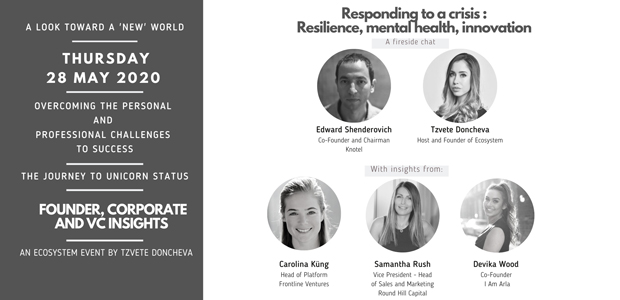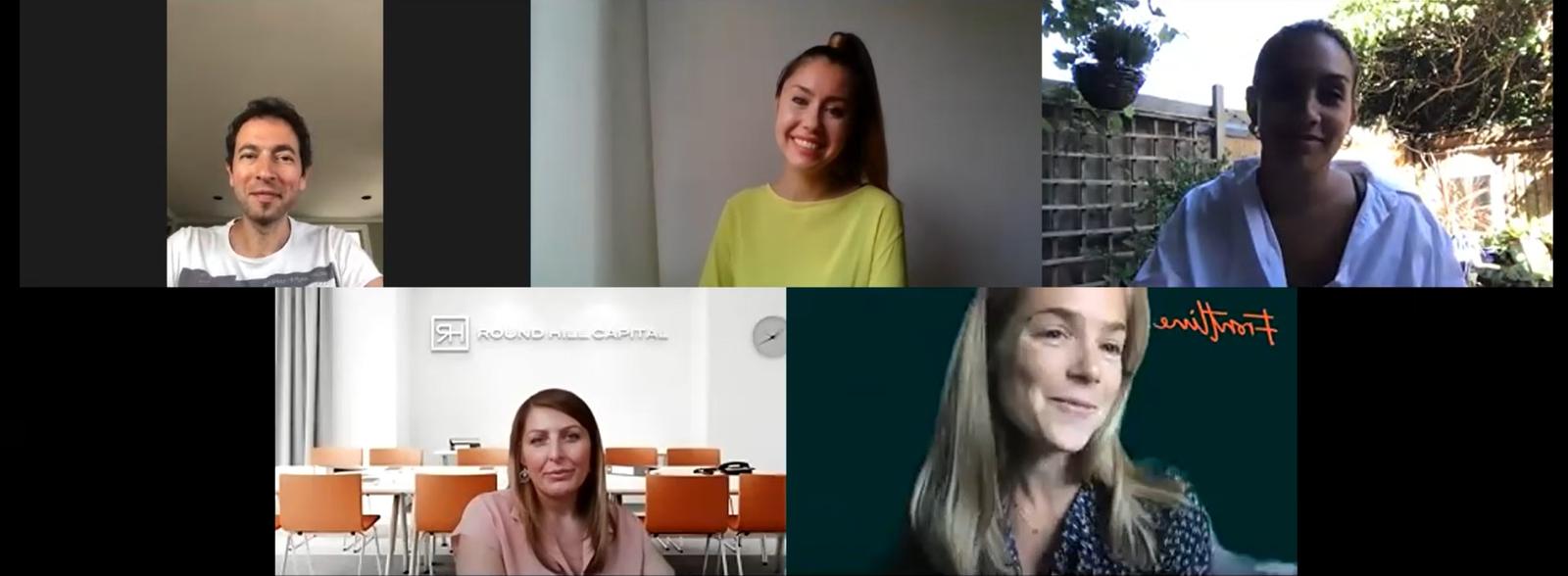
Innovation ecosystem leaders normalise the conversation around mental health
Earlier this month, the UN warned of global mental health crisis due to COVID-19 pandemic. As the world is returning to 'new normal', serial entrepreneurs and key figures from the real estate and venture capital industries opened up in a conversation around surviving a crisis and channelling trauma into strength.
The latest ‘Ecosystem’ webinar series commenced with a chat on overcoming adversity between one of world’s most successful entrepreneurs in the PropTech sector Edward Shenderovich(Co-Founder and Chairman, Knotel) and start up strategy advisor Tzvete Doncheva.
Edward scaled Knotel, a lead player in the flexible workspace market, from 2 to near 500 employees in under 4 years. Since Coronavirus hit, the company let go of nearly 50% of its staff.
“It’s both difficult to scale up and get rid of fat but it is like exercising. In building companies, there are some ‘fat’ years and some ‘lean’ years. You need to act differently and have the ability to adapt.”- said Edward.
What followed was a panel discussion with Samantha Rush (head of VP-marketing and sales at Round Hill Capital,) Devika Wood (founder of I am Arla) and Carolina Kung (Head of Platform at Frontline Ventures).
“We live in a society where our attention is spread thin at all times. This ends up eroding the physical, emotional and mental health. As a new parent, the concept of stress has taken up a whole new meaning for me in the last 12 months – its a daily struggle where you feel like you have to consistently do more, consistently do better and realizing that you are just not capable of doing it all” - admitted Carolina, whose role is to support the founders of leading venture capital firm Frontline Ventures get to the next level of growth.
“Stress is the driver of evolution. It is like exercise, you can’t do too much at the same time but the more you go through stress, the easier it is. You stay sane by remembering how you went through it last time,” added Edward.
Failing to seek help on time in a crisis results in more damaging, long-term effects.
"Truly burning the candle at both ends, working a minimum of twelve hours days, going to the gym five times a week and travelling to Liverpool every weekend. After ten months of operating at intense levels, I found myself in the hospital with Kidney failure," shared Samantha, who heads the marketing and sales function at multinational real estate investment manager, Round Hill Capital. "To ensure we operate at our optimum levels while remaining conscious of our wellbeing, we should all be aware of the 'burnout; early warning signs, these are, extreme fatigue and low energy levels, a reduction in performance, feelings of anxiety and detachment."
Very often, ‘All that glitters is not gold.’
“There is a massive struggle that goes with trying to reach your potential as an entrepreneur, there is a lot of pressure put on you not only by the investors that are investing in you but the society as a whole,” said Devika Wood, who raised over £2.7m for her first start up while in her early twenties.
She added: “I was put as an ambassador for United Nations’ Women in STEM campaign last year – my face was plastered all over London. I remember sitting down in front of my office with my mom, rocking back and forth, feeling suicidal because of what I was experiencing in the company that had put me to that place on those billboards.”
“It’s important to surface two hidden things that massively add to the pressure on founders, things that aren’t discussed nearly enough: Number one: the false understanding that most founders - including those sat around you right now - are 'killing it' or 'smashing it'. Secondly, the myth that working yourself to the bone is the way to build a successful company," added Carolina.

How does it feel to raise a $400m dollar series C round?
“Every fundraise ultimately puts more pressure on you and on the company. Raising several hundred thousand is different than raising several hundred millions.”
The panel broadly agreed a worry shared is a worry halved, making them easier to identify, digest and solve.
"When you verbalise things, they often become trivial. Don’t keep it in yourself. Share your worry with millions and it will be a fraction of what the worry would be otherwise,” advised Edward.
“The biggest lesson I learned is that you need to have somebody alongside you who is going to support you and help you get through those really horrible times. If you take it out that burden of embarrassment and shame from within, the worry just doesn’t exist anymore. The more that we share as people and as humans, the easier it is for us to get through to the next bit," agreed Devika.
From a VC perspective, the importance of vocalising concerns was highlighted. Carolina advised investors should respect the privacy and the individuality of the founder.
The speakers also agreed it is essential to have a routine in order to maintain a healthy mind-set during and after the lockdown and to be kind – to each other and to one self.
“Try to be OK with good. Perfect can often be the enemy of good.”- added Carolina.
"At Round Hill Capital, our response to the pandemic has fallen into four areas, and they've developed into the four C's - consequences, communication, compassion and control.Our focus has been on evaluating the consequences of the pandemic, and prioritising workload to mitigate impact. We communicate regularly and consistently with all our stakeholders, remembering they all are human beings, who are facing new challenges every day." - said Samantha.
The panel concluded with an agreement of the importance of appreciation of the present.
“Try not to find solace in moments long gone and not to seek happiness in the future. The past and the future are inextricably tied together in the present. It’s the only moment that truly matters.", was Edward's final piece of advice.
The event ended with Niamh Keane, trained ICF Coach and one of Europe's leading meditation teachers and Ross Taylor, founder of Hidden giving practical tips to the listeners on overcoming mental health challenges.
“Our bodies are amazing at storing and holding emotional memory and trauma. " said Niamh.
She added an important question to ask oneself prior to making an important decision when feeling under stress or triggered - is to ask where this action is coming from and what is driving it, it is coming from a place of love or from a place of fear?
“Most fears can be associated with a perceived loss. Drilling down into the perceived loss, brings you closer to the root of the fear, which means we can begin to heal it.” - added Niamh.
Now is an opportunity for the founders/VCs to create a far more empathetic relationship than previously. A practical tip to do that is by asking simple, open-ended questions.
“Everybody asks how you are. Ask it twice and stop talking. Take a moment to listen and get comfortable with silence.
Since the lockdown was imposed, Doncheva’s 'Ecosystem' webinar series have been gathering Europe's leading investors, innovators, corporate players and public sector actors in a forum of a knowledge exchange – sharing insights and connecting in the age of social distancing.

